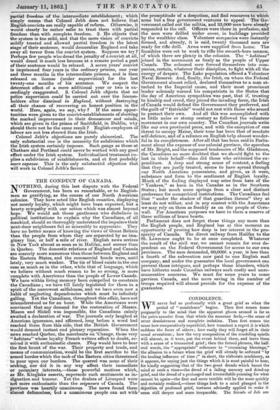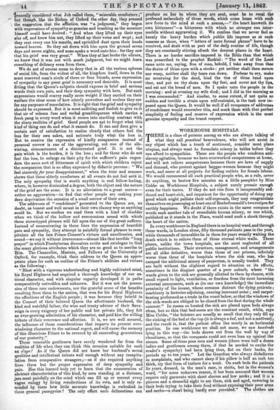CONDOLENCE.
WE never feel so profoundly with a great grief as when the period of "condolence" begins. Then first comes home poignantly to the mind that the apparent gloom around is far as the poles asunder from that which the mourner feels,—the sense of utter desolateness and complete isolation. Then first comes the sense how comparatively superficial, how transient a regret it is which saddens the faces of others ; how easily they will forget all in their usual avocations ; how the very composition of the condoling epistle will almost, as it were, put the event behind them, and leave them with a sense of a transacted grief; then the formal phrases, the half- real words, the "appropriate" reference to "remaining blessings," the allusion to a future when the grief will already be softened "by the healing influence of time ;" in short, the elaborate machinery, as it appears, for saying just the things which it is most painful to hear, for kindly suggesting that of the two great dreads which haunt the mind at such a time—the dread of a failing memory and dried-up grief, and the dread of a prolonged and irremediable yearning for what cannot be again—the first and more terrible will be the more quickly and certainly realized,—these things look to a mind plunged in the dejection of profound grief, tortures advisedly applied to make it seem still deeper and more irreparable. The friends of Job are Centrally considered what 'rob called them, "miserable comforters ;"
• '` but though, like the Bishop of Oxford the other day, they pressed . the suggestion that the affliction was "a judgment," they began with expressions of sympathy as genuine and touching as the mourner himself could have desired "And when they lifted up their eyes afar off, and knew him not, they lifted up their voice and wept ; and they rent every one his mantle, and sprinkled dust upon their heads toward heaven. So they sat down with him upon the ground seven days and seven nights, and none apake a word unto him; for they saw that his grief was very great." When they at last broke the silence, we know that it was not with much judgment, but we might learn something of delicacy even from them.
We do not of course mean to deny that in all the various spheres of social life, from the widest of all, the kingdom itself, down to the most reserved man's circle of three or four friends, some expression of sympathy in any great grief is necessary and desirable. It is most fitting that the Queen's subjects should express in brief and serious words their own pain, and their deep sympathy with hers. But such expressions would convey really more weight if they carried on their surface the clear sense of how utterly powerless and useless they are for any purposes of consolation. It is right that the grief and sympathy should be expressed. But it is most unfitting and foolish to give to it that air of solemn fuss and verbal grandiloquence which carries a fresh pang in every word when it comes into startling contrast with the sharp realities of grief. Good people are apt to forget what this kind of thing can do and what it cannot do. It can and does give a certain sort of satisfaction to realize clearly that others feel the loss for their own sakes, and estimate truly what the loss is. But to receive the expression of kindly compassion instead of personal sorrow is one of the aggravating, not one of the alle- viating, circumstances of a disinterested grief. It is not the pain which is the burden, it is the loss ; and for those who do not feel the loss, to enlarge on their pity for the sufferer's pain engen- ders the same sort of bitterness of spirit with which children reject the compassion that is so often expressed by didactic persons : "We feel sincerely for your disappointment," when the tone and manner shows that these elderly comforters at all events do not feel with it. The only sympathy that is worth anything is real fellow-feeling, where, in however diminished a degree, both the object and the nature of the grief are the same. It is no alleviation to a great. sorrow— rather an aggravation—to find that other people are making your deep deprivation the occasion of a small sorrow of their own.
The addresses of "condolence" presented to the Queen are, no doubt., as honest and well meant in their own clumsy way as anything could be. But we confess we read them with a kind of shudder when we think of the hollow and ceremonious sound with which these stereotyped phrases will fall upon the ear of the great sufferer. Instead of concentrating in three lines the expression of heartfelt pain and sympathy, they attempt in painfully formal phrases to reca- pitulate all the late Prince Consort's virtues and excellencies, and sound—we say it without irreverence—almost like that terrible "long prayer" in which Presbyterian dissenters recite and catalogue to God the many glorious attributes which they are so good as to ascribe to Him. The Chancellor, Masters, and Fellows of the University of Oxford, for example, think their address to the Queen an appro- priate place for such an outline of the Prince's abilities and virtues as the following : "Blest with a vigorous understanding and highly cultivated mind, his Royal Highness had acquired a thorough knowledge of our na- tional character, and with singular sagacity developed it in paths comparatively untrodden and unknown. But it was not the posses- sion of these rare endowments, nor the grateful sense of the benefits resulting from them to the nation, that won for his Royal Highness the affections of the English people ; it was because they beheld in the Consort of their beloved Queen the affectionate husband, the kind and watchful father, the wise and trusty adviser of their Sove- reign in every exigency of her public and her private life, they felt an ever-growing admiration of his character, and paid him the willing tribute of their reverence and affection. It is, we are well assured, the influence of these considerations that imparts its present over- whelming character to the national regret, and will cause the memory of this illustrious Prince to be revered by all succeeding generations of our posterity."
These venerable gentlemen have surely wandered far from the realities of life when they can think this occasion suitable for such an lioa. ! As if the Queen did not know her husband's moral qualities and intellectual talents well enough without any recapitu- lation from comparative strangers ;—as if she required anything from them but the proper expression of deep sympathy and pain. Has this learned body yet to learn that the enumeration of abstract characteristics of this kind, by men standing at a distance, jars most painfully on the mind which can fill up or correct every vague eulogy by living recollections of its own, and is only re- minded by them how little accurate knowledge is embodied in these general panegyrics ? The only effect such delineations can
produce on her to whom they are sent, met be to recia the profound melancholy of those words, which come home with sue)] new force to the mind at such a season,—" the heart knoweth its own bitterness"—a bitterness with which no stranger can inter- meddle without aggravating it. We confess that we never feel so keenly the heavy burden which public life imposes as at such seasons as these, when "letters of mere formal phrase" have to be received, and dealt with as part of the daily routine of life, though they are constantly stirring afresh the deepest places in the heart. There is no harder sacrifice imposed in the Bible than that which was prescribed to the prophet Ezekiel: "The word of the Lord came unto me, saying, Son of man, behold, I take away from thee the desire of thine eyes with a stroke : yet neither shalt thou mourn nor weep, neither shall thy tears ran down. Forbear to cry, make no mourning for the dead, bind the tire of thine head upon thee, and put on thy shoes upon thy feet, and cover not thy lips, and eat not the bread of men. So I spake unto the people in the morning : and at evening my wife died; and I did in the morning as I was commanded." And similar, to some extent, if not quite so sudden and terrible a strain upon self-restraint, is the task now im- posed upon the Queen. It would be well if all composers of addresses of condolence would remember this, and mark them with that perfeet simplicity of feeling and reserve of expression which is the most genuine sympathy and the truest respect.































 Previous page
Previous page